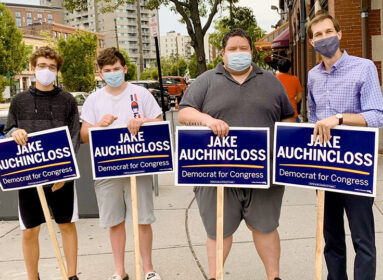In 1964 I read your editorials, written as chairman of the Yale Daily News from Mississippi, where you were a nice Jewish boy from Stamford, Conn., risking your comfortable life (and indeed, perhaps your very life itself) in the great moral cause of our generation: ending segregation and winning civil rights for all black Americans.
In 1966, just two years out of college and still in Yale Law School, you ran for the New Haven Board of Aldermen. Now I was chairman of the Yale News. The leading Republican columnist on the editorial page, Victor H. Ashe, walked into my office and handed me his column for the next day — calling on you to take yourself out of the race because you could not serve since you weren’t a legal resident of New Haven long enough to qualify.
“You can’t write that,” I told Victor. “You are taking down my best friend on our editorial page.”
I called Joe and told him the situation. “No way — I’m not running the column.”
“Oh yes you are,” Joe said. “Victor is right — I just checked it out. And you’re the chairman of the oldest and best college daily newspaper in America — act like it.”
In 1970, I was in the bathroom with a towel over my ears. In the living room, surrounded by my parents and friends, there you were — the sandek at the bris — holding my 8-day-old son Seth for the 3,000-year-old Jewish ceremony while the rabbi made the magic cut. I awarded you the title of godfather for doing me (and Seth) that great favor.
In 2000, you stood at the podium as the vice presidential nominee of the Democratic Party, the first Jew to be so honored, and I sat next to your mother, both of us crying, as you began your acceptance speech, in genuine wonder and awe: “Is this a great country, or what?”
In 2006, you lost a Democratic primary in Connecticut because your liberal base wouldn’t forgive you because you genuinely believed a democratic Iraq without Saddam Hussein was worth going to war over. I disagreed with you on that position. But I also knew that you were and always would be a progressive Democrat — that you had voted more than 90 percent of the time with your fellow Democratic senators.
On primary night, when you had lost, I stood heartbroken in your hotel suite in Hartford. My son and your godson, Seth, now 36 years since the magic cut, arrived.
“So sorry, Godfather,” Seth said.
“This is the business we are in,” you responded, in a Marlon Brando voice that, at a moment of sadness throughout the crowded room, brought the house down.
But you didn’t quit. You won as an Independent Democrat — a label that best exemplified your life in politics.
And then in 2011, you were the crucial progressive leader in the U.S. Senate who ended, once and for all, “Don’t ask, don’t tell.” Yet most of the more vicious left of the Democratic Party who had been your severest critics over the years didn’t have the grace to thank you.
There is something especially sad that you, an important symbol of decency in politics, should pick this week to announce your retirement — the week after the murderous violence in Tucson, Ariz., left so many people in America frightened of the atmosphere of violence and polarization that has become the hallmark of our politics in too many places.
You will be missed, Sen. Lieberman — just at the time where the role of a “bridge-builder” between Democrats and Republicans, between liberals and conservatives, is needed more than ever.
You showed it is possible to be a genuine liberal Democrat on the major issues — but still able to work with Republicans, with conservatives, and be trusted by them. You were the model “purple” politician.
Lanny Davis, the principal in the Washington law firm of Lanny J. Davis & Associates, served as President Bill Clinton’s special counsel from 1996-98 and as a member of President George W. Bush’s Privacy and Civil Liberties Oversight Board. He is the author of the book Scandal: How ‘Gotcha’ Politics Is Destroying America.
This article first appeared in The Hill.







 Southern New England Jewish Ledger
Southern New England Jewish Ledger













